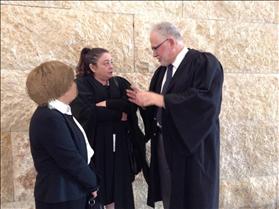Justices deeply troubled by excommunication as means of coercion
Supreme Court hears Hiddush petition against coercive rabbinical court
Justice Mazuz: “The ‘Writs of Refusal’ are intended to deny a person his rights as a man and a citizen by blocking his/her way to State institutions (i.e. - the courts) that can render him remedy in realizing his rights.”
26/07/2015 15:50
Tags: writ of refusal · excommunication · supreme court · elad · rabbi uri regev

Elad Resident CC and Lawyers Rabbi Uri Regev and Edna Meyrav
Last week, at a Supreme Court hearing for a petition submitted by Hiddush representing ourselves and an ultra-Orthodox citizen of the ultra-Orthodox city of Elad, the Justices set the stage for a critically important confrontation over the clash of religion and state in Israel.
The petition was submitted in response to a “Writ of Refusal” (excommunication notice) which an ultra-Orthodox rabbinical court of Elad, enjoying the imprimatur of the Chief Rabbi of Elad, issued against Hiddush’s client. Her “sin” was turning to a civil court for an injunction against a neighbor who was illegally extending his porch over her patio, thereby rendering her Sukkah non-Halachic. The ultra-Orthodox rabbinic court viewed her act as heretical, since Israel’s civil courts and law, they maintain, are illegitimate; and therefore required them to announce that she should be excommunicated.
The case has been pending for quite a while. In the meantime, the Attorney General has agreed that this is illegal and threatens the rule of law in Israel; and ordered a criminal investigation into the matter. At the hearing, however, the AG’s office was unable to inform the Court of when the investigation review would be concluded and decisions made as to actual criminal charges brought against the rabbinic judges. The Court hearing was detailed and long, and the Justices clearly expressed their sympathy for our petition, not hiding their dismay and sharp criticism of such an extreme assault on the civil judiciary. Justice Mazuz explained: “The ‘Writs of Refusal’ aim to deny a person his rights as a man and a citizen by blocking his/her way to State institutions [i.e. - the courts] that can render him remedy in realizing his rights.”
It’s not possible to minimize the terrible effect of a ‘Writ of Refusal.’ If a rabbinical court excommunicates someone for turning to the civil court system for justice, that is threatening and terrible, said Justice Uri Shoham.
The High Court ordered the Attorney General’s office to update it within four months, regarding the outcome and steps taken as a result of the criminal investigation against the rabbinic judges of Elad; and whether the private rabbinical courts that operated illegally out of the Chief Rabbinate’s office in Elad have been moved elsewhere. Hiddush CEO Rabbi Uri Regev, Esq., acting in the capacity of the attorney arguing the case, claimed that the writ of refusal was issued without authority and in contravention of the law, constituting a criminal offense of obstruction of justice and extortion. Rabbi Regev asked that the Court also nullify it and declare that it was issued without authority.
“It’s not possible to minimize the terrible effect of a ‘Writ of Refusal.’ If a rabbinical court excommunicates someone for turning to the civil court system for justice, that is threatening and terrible,” stated Justice Uri Shoham on Thursday at the hearing. Shoham also declared, “’Writs of Refusal’ should not exist in a democratic country.” He emphasized that this petition has already achieved the following: the opening of a criminal investigation against the rabbinic judges of Elad, formulating the Attorney General’s official position that “outright condemns the phenomenon of ‘Writs of Refusal’,” forbids issuing them, and more.
The other Supreme Court Justices were also deeply troubled. Justice Salim Joubran, who chaired the panel, sharply criticized the phenomenon of private religious courts that operate under the auspices of official public bodies. “The problem is that private rabbinical courts hold their hearings in the Chief Rabbinate’s local offices, or in city hall. There should be total separation. If we achieve this - it will move us forward." Justice Menachem Mazuz added, “It is necessary to be strict about the total separation between the activities of private rabbinical courts and the authorities.”
The petitioners emphasized that “writs of refusal severely impact on the rule of law, and have led to the creation of a ‘state within a state.’” Rabbi Regev declared that “the private rabbinical courts transgress the law, ruin people’s lives and rob citizens of their rights.” Regev added, “This dangerous phenomenon threatens the rule of law. A clear ruling must be handed down in this case because there is no knowing when another brave and determined woman such as the petitioner will again come forth, willing to fight publicly for her rights and dignity.” The petitioner “is paying a heavy price in suffering and harm to her family and emotional health. She is making this necessary sacrifice to save others from the tyranny of the private rabbinical courts.”